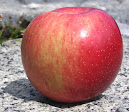Genetic analyses get cheaper and more powerful every year, busting myths and providing information about the lineage of apple cultivars.
Honeycrisp, to cite a notorious example, is not a Macoun x Honeygold cross, as breeding records from the 1960s suggested.
It is rather Keepsake x MN1627 (the latter an uncommercialized variety that has not survived).
It was not until 2005 that science ruled out Macoun and Honeygold. It took another 12 years to identify the true parents.
Today, the floodgates are are opening. A reader shared a paper published in this month's HortScience that applies modern techniques to 28 apples bred by the University of Minnesota.
New Science
The 28 apples analyzed comprise the full cohort introduced commercially by the University since 1916, when its breeding program began using controlled crosses.
They include not only Honeycrisp but also Haralson, Keepsake, and Minneiska (SweeTango).
The findings are thoughtfully presented in a single table and the paper is quite short.
A kind of pedigree chart rewards the reader with an explanation of multiple generations and what the new analysis revealed.
Last year, a different analysis looked at the genetic diversity of more than a thousand apple varieties (spoiler alert: not so diverse).
Genetic analysis is also helping the UK's National Fruit Collection to prune and organize its apple database.
The authors of this year's report are all of the Department of Horticultural Science at UMinn. What would similar projects tell us of the received wisdom about other varieties?
Luby, James, Nicholas Howard, John Tillman, and David Bedford. 2022. "Extended Pedigrees of Apple Cultivars from the University of Minnesota Breeding Program Elucidated Using SNP Array Markers" HortSci 57(3)
The image of DNA molecules is in the public domain.


Comments
Post a Comment
Join the conversation! We'd love to know what you think.